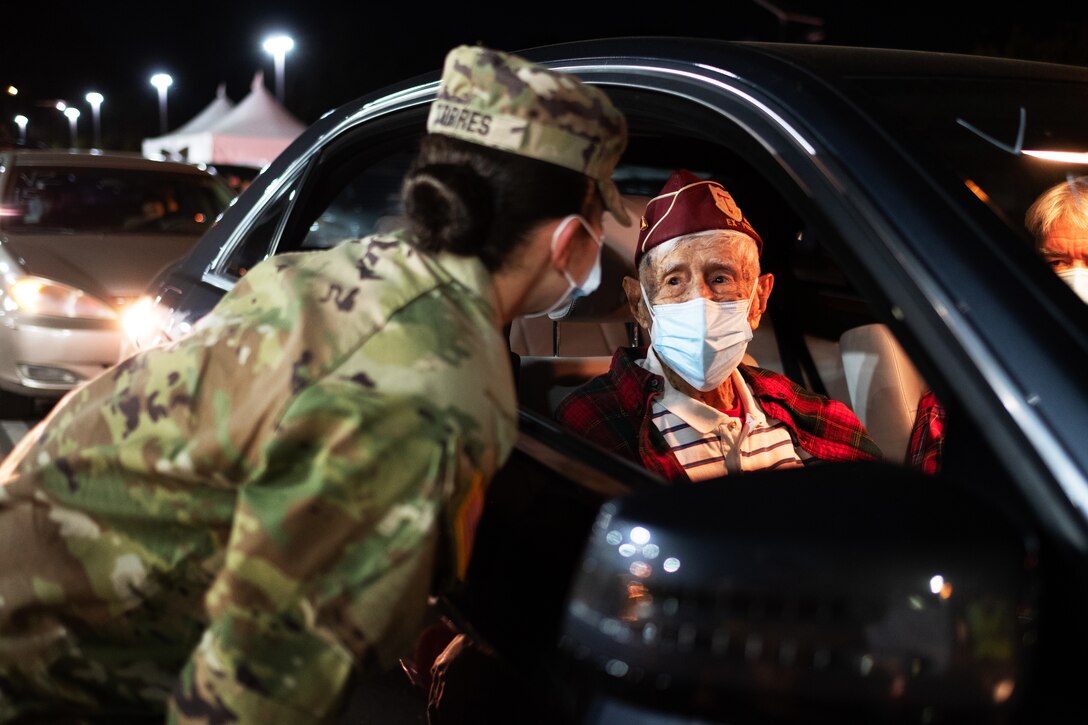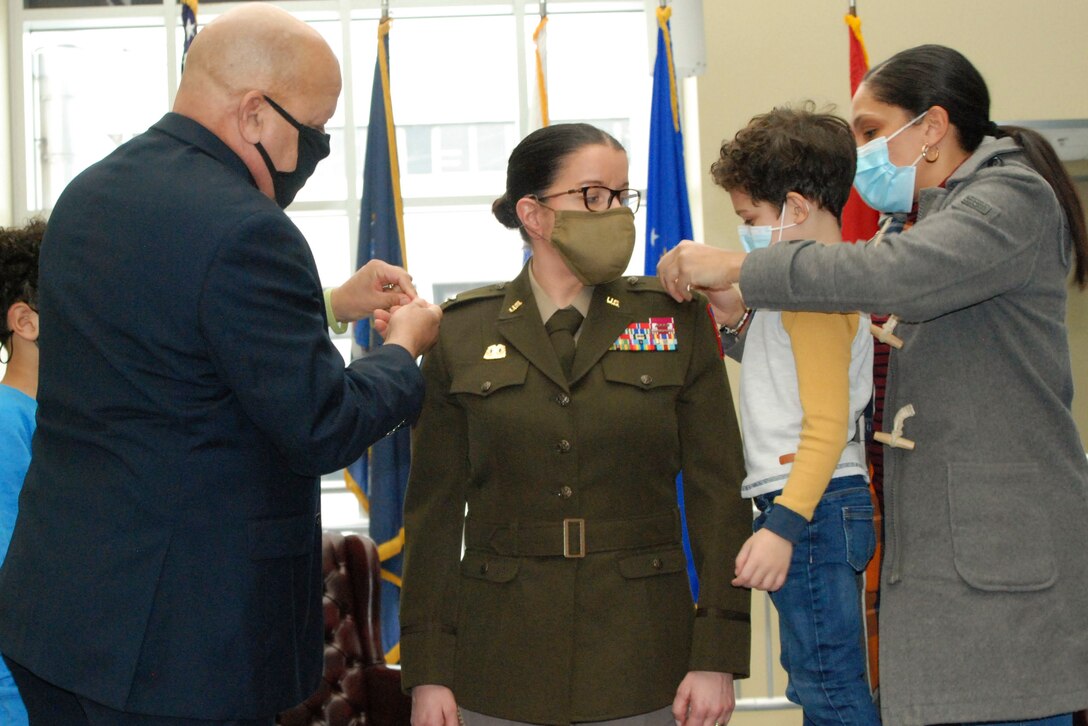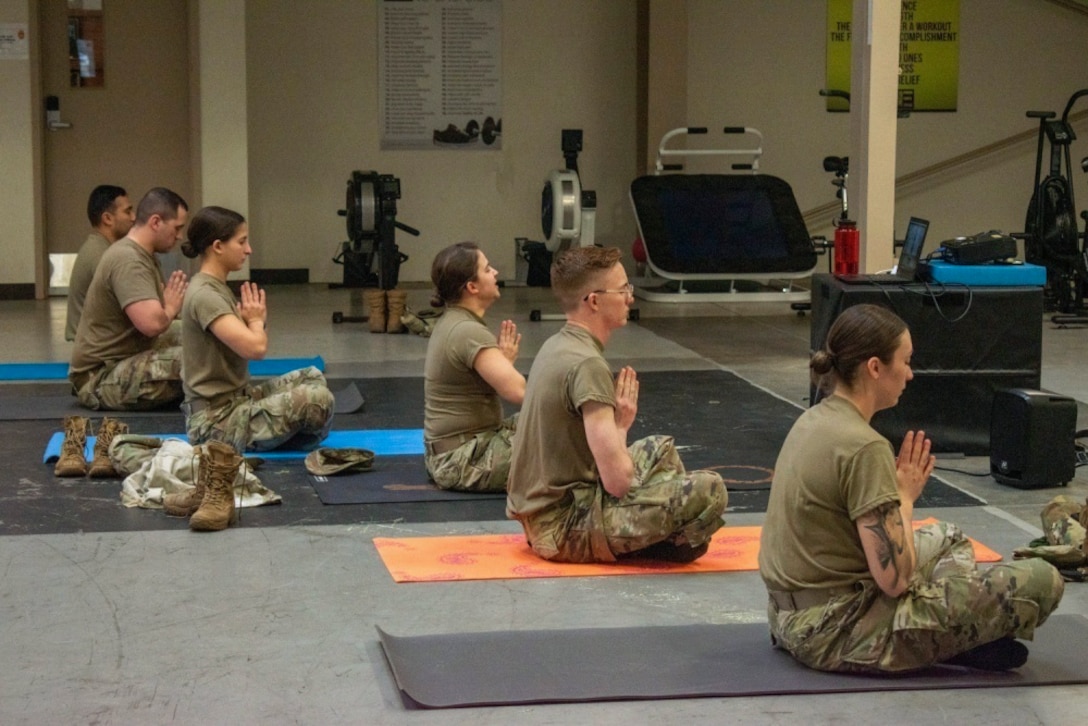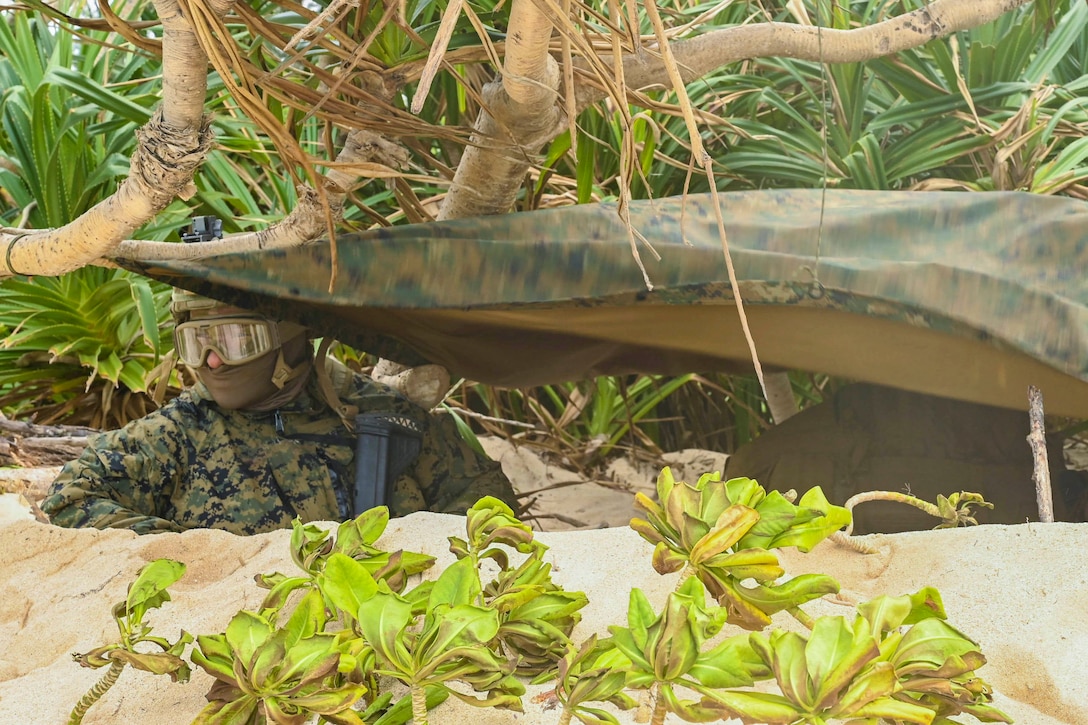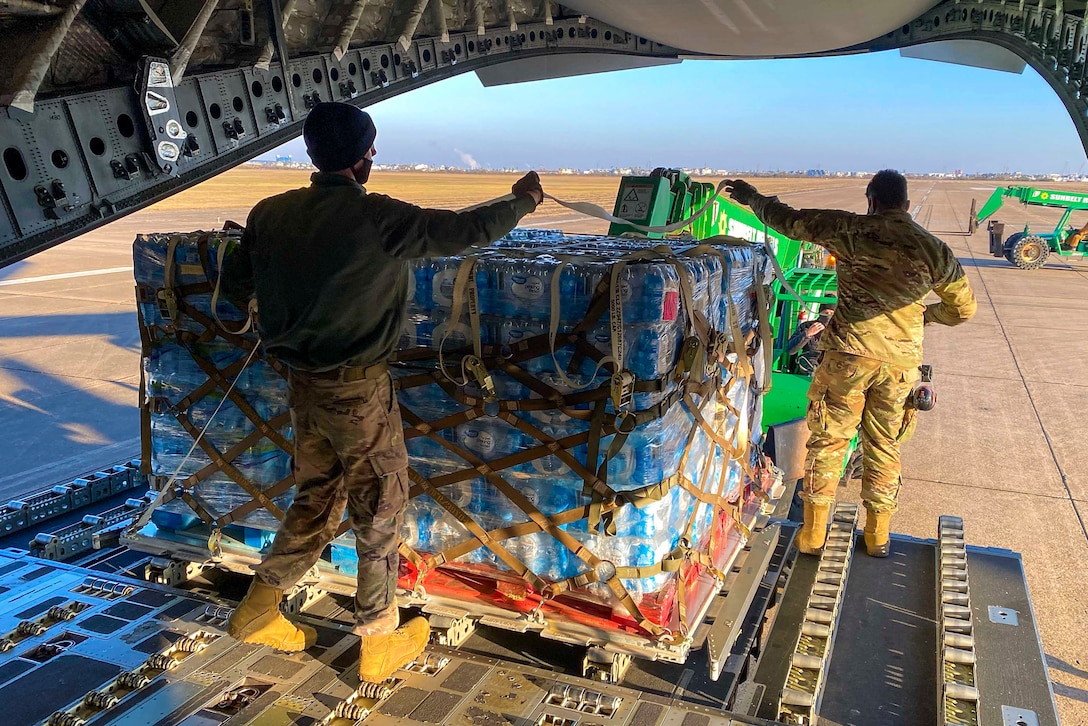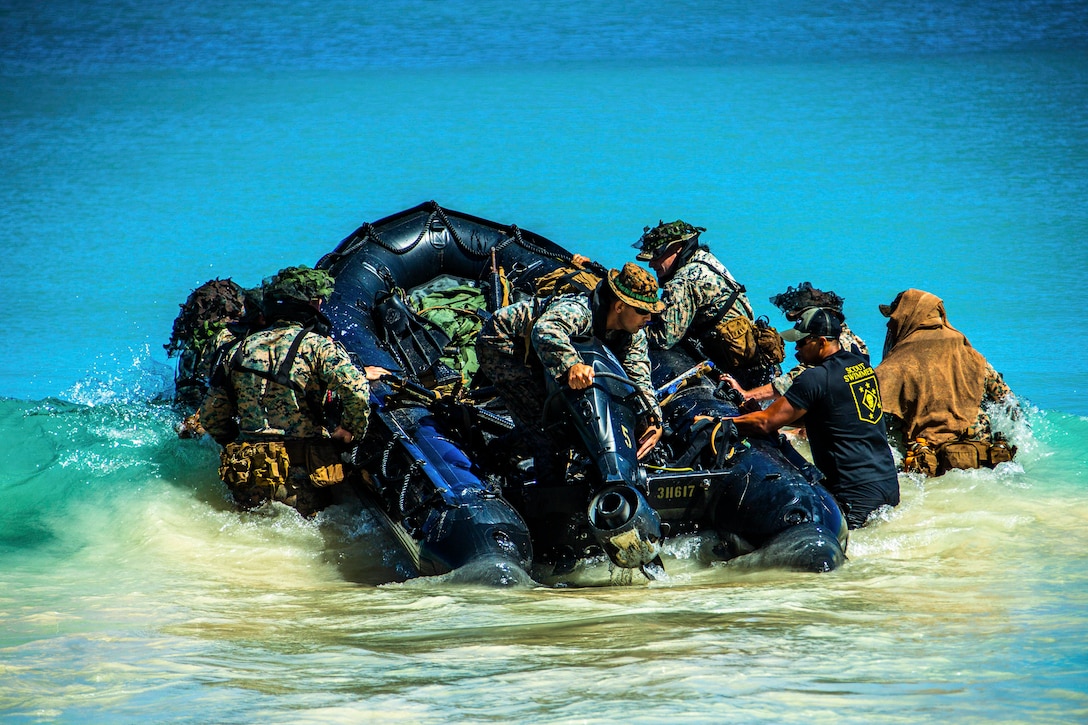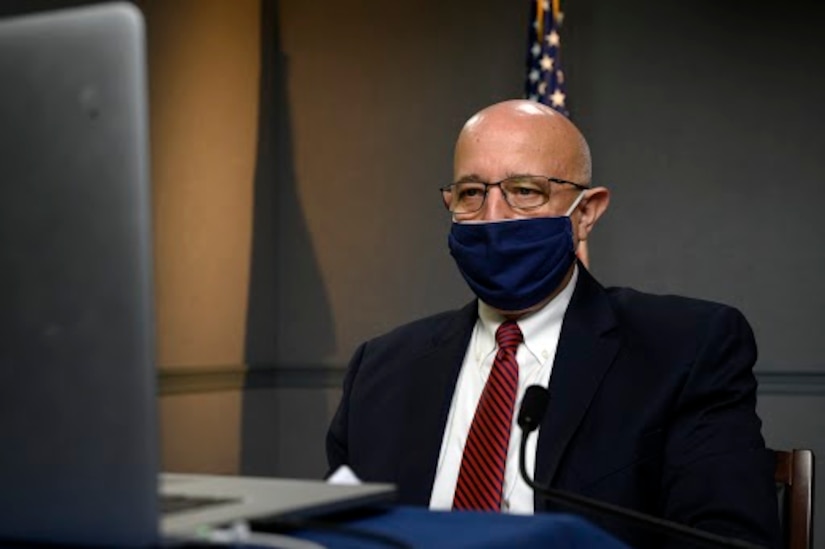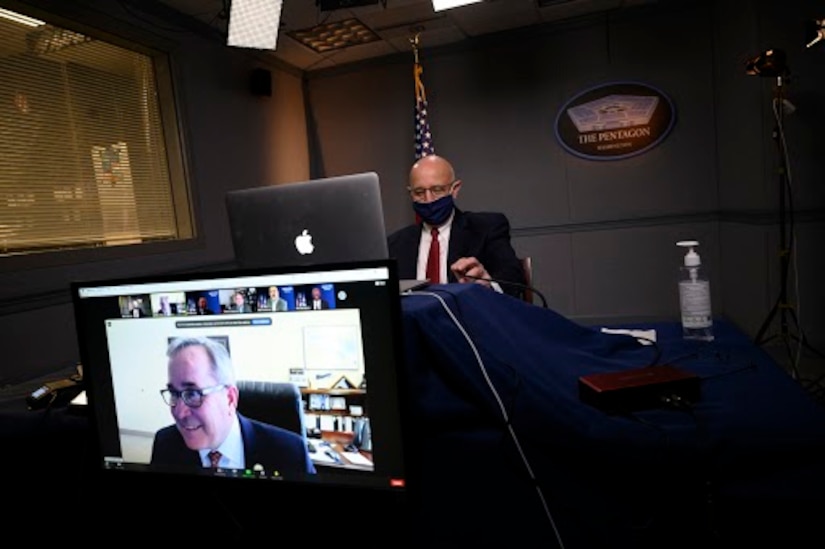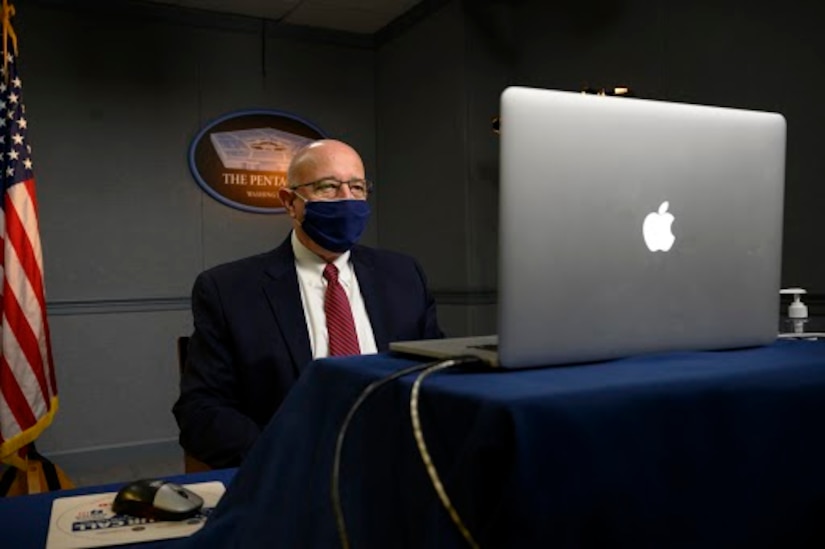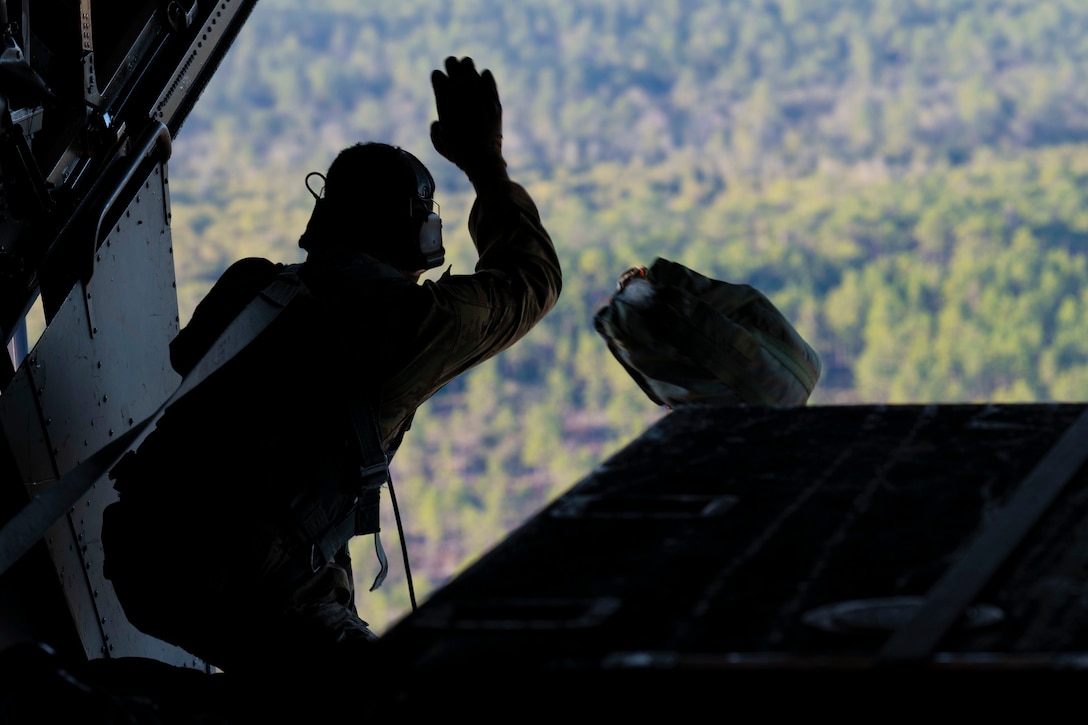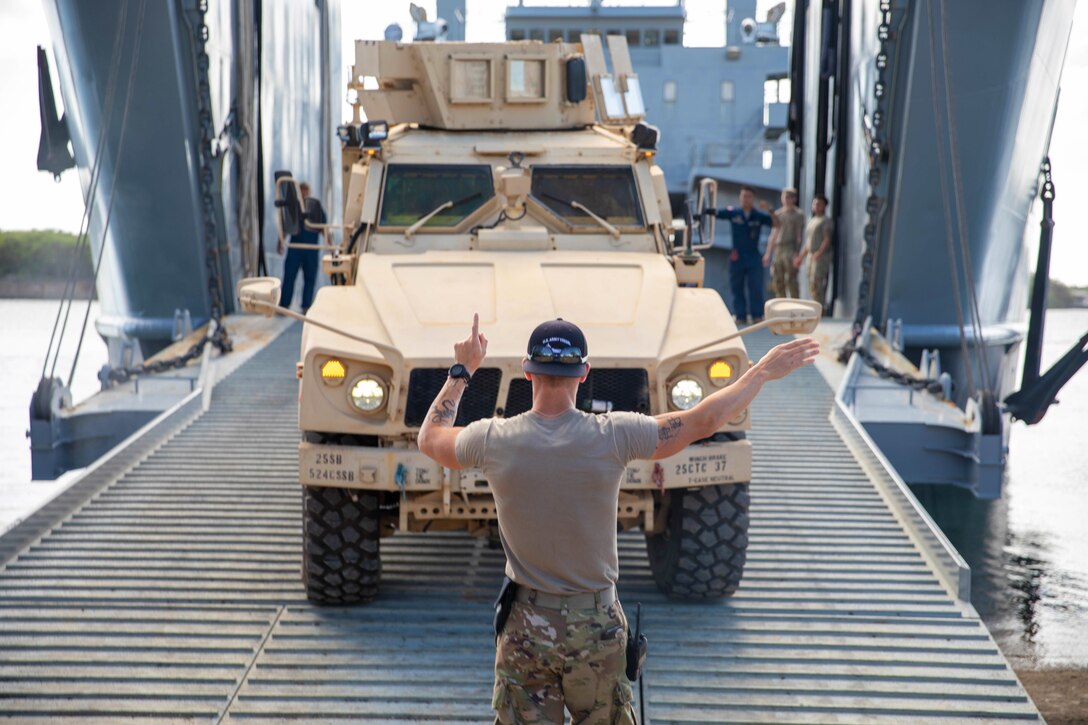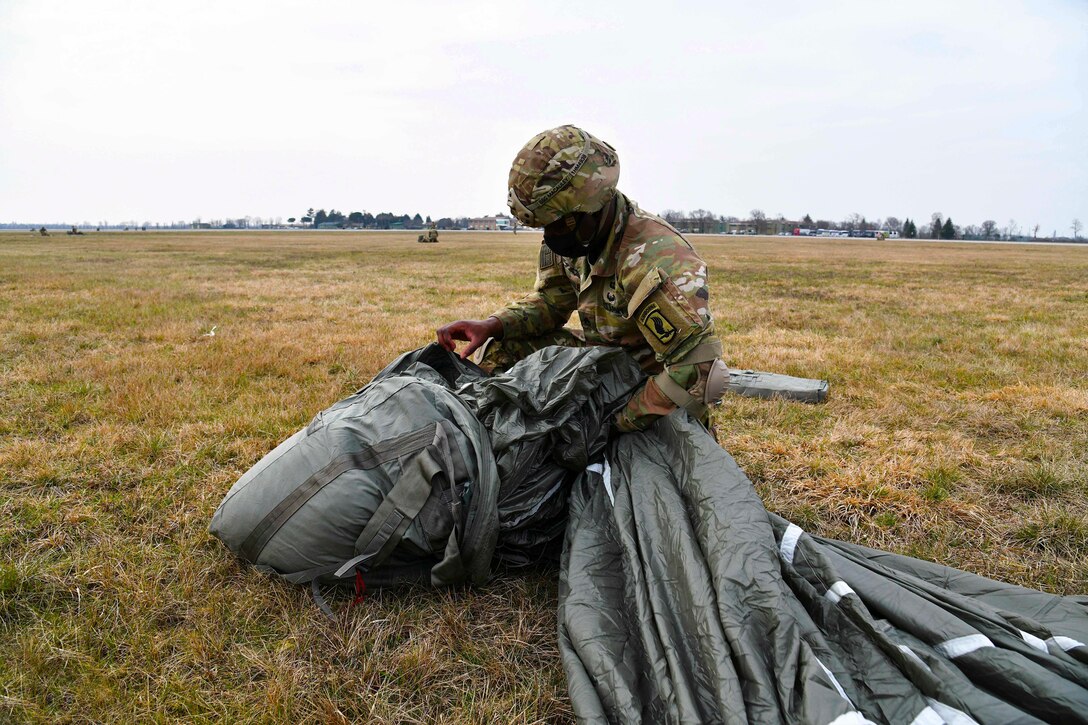Feb. 23, 2021
Pentagon Press Secretary John F. Kirby
PRESS SECRETARY JOHN F. KIRBY: Hey, everybody. I
actually don't have anything to open up with this morning, so Bob, I
think you're on, we'll go with you.
Q: OK, thank you -- thank you, John. A question about -- on the
Afghanistan policy review that's underway. Is Secretary Austin going
to, or already consulted, directly with President Ghani about the May 1
deadline? And also, is he going to consult or has already consulted
directly with General Dunford regarding the Afghan Study Group analysis
and recommendation on this?
MR. KIRBY: Bob, I don't believe he's had a conversation with General
Dunford about the study group -- he's certainly aware of the group's
findings and the -- and the tenor of the report -- but we have obviously
been in constant communication with our Afghan partners about the
review process and how we're working our way through that.
And as the Secretary said on Friday, we're mindful of looming
deadlines here and -- and everybody shares the sense of -- of alacrity
when it comes to working our way through this review but we want to do
it in a thoughtful, deliberate way, to make sure that we're -- that
whatever decisions are made, they're the best ones, that are in our
best national security interests and the -- certainly the security
interests of our allies and partners, and that includes the Afghan
people.
Q: So is he going to talk to General -- I mean President Ghani about it?
MR. KIRBY: I -- I don't have a -- a -- a future conversation to
announce here today but obviously we'll keep you posted as he continues
to consult with our allies and partners. OK, let's see. Missy?
Q: Hi -- hi, John, thanks for doing this. I just have a quick
question, and apologies if I missed this. Senator Klobuchar said this
morning in the Capitol riot hearing that there was going to be another
hearing next week, including people from Department of Defense --
witnesses. I'm just wondering if you could tell us who is going to be
doing that and any info on that? Thanks.
MR. KIRBY: I don't have a list of names, Missy. I'll try to get
that for you and we'll we'll let you know when we have some names to
announce as a part of that but I don't have it today.
Q: OK, thanks.
MR. KIRBY: OK, in the room. Yeah?
Q: Two things. One ...
MR. KIRBY: There's always two things.
(Laughter.)
Q: I'm sorry, you always have (inaudible) -- tell me about this.
Well yesterday, it seems like there's -- there's been some confusion.
Your statements were clear, you're still waiting for the investigation
into the attacks in Iraq. State Department spokesperson Ned Price
seemed to be saying that there is evidence the weapons used in the Erbil
attack were provided by Iran and were made by Iran. Can you clarify
this issue? And then I have a broader question on ...
MR. KIRBY: I've -- I've taken a look at ...
Q: ... (inaudible), there was a follow up by a journalist when he
first answered the question and it's -- it's not really clear whether he
was referring to Erbil specifically but because he mentioned it in
saying that weapons provided by Iran and Iranian-made weapons.
MR. KIRBY: Yeah, I mean, I'm looking at what he said yesterday and
his final comment on it was, and I'm quoting him, "I'm saying that,
broadly speaking, we have seen that many of these attacks have used
Iranian-made, Iranian-supplied weaponry."
I don't want to -- I mean, it's not -- I -- I -- I would point you to
Ned to -- to -- to -- for more context here but the impression I took
away was he was saying the same thing I've said from this podium, which
is that in the past, we have seen, in these attacks, historically by
Shia-backed militias, that they do use Iranian rockets, Iranian weapons,
but we aren't making -- we aren't -- you know, right now, we're not
able to give you a certain attribution as to who -- who was behind these
attacks, what groups, and I'm not going to get into the tactical
details of every bit of weaponry used here. Let's let the
investigations complete and conclude, and then when we have more to say,
we will.
Q: And -- and -- and the attack on Erbil and -- and the embassy, is
-- is the U.S. in possession of any of the fragments or weapons used?
Were you able to collect...
MR. KIRBY: I'm not aware. I'm not aware of that. I mean, I -- I'd
ask you to go to our Iraqi partners for that, or if you want to, you
know, talk to Operation Inherent Resolve, they might have more detail. I
don't have that kind of information.
Q: The -- the -- the broader question is, the previous
administration pulled out from Iran nuclear deal, which was, you know, a
deal that the U.S. had with major powers. Now, the new administration,
the Biden administration's saying, "We need to review the deal with
Taliban." Is the department concerned at all that this will create some
kind of confidence deficit, when it comes to U.S. commitments to treat
-- not treaties -- to -- to any deals or agreements with international
powers or with other groups?
MR. KIRBY: You're getting me into State Department territory here. I
mean, that's -- that's not the kind of thing we would talk to you from
this podium, in -- in terms of international deals and agreements.
Q: Yes, I understand. (inaudible)...
MR. KIRBY: Let me finish. I'm not going to talk about the Iran deal
or what the administration is saying. That's really more for my
colleague, Ned, to talk to, not -- not me.
But to Afghanistan in particular, I think it's perfectly reasonable,
when you have a new administration coming in, to want to take a look at
the Doha Agreement, which was agreed to before this administration took
office. So perfectly understandable, given the stakes in Afghanistan,
for us to want to come in and take a look at that and to look at the
issues of compliance, and to try to make informed decisions about what
the best way ahead is. And -- and that is, honestly, where we are right
now; in -- in the midst of this interagency review. And you heard the
secretary himself talk about this on Friday. We're taking it very
seriously.
And so, to your broader question about messaging and confidence, I
think -- we would hope that people would feel a sense of confidence that
we are taking this so seriously; that we want to dive into the details
and better understand it, mindful of our security commitments around the
world, and particularly, to our Afghan partners.
OK?
Q: Could I just go back to...
MR. KIRBY: Sure.
Q: ... the Iraq aspect of it again, in Erbil and Baghdad. It's the Iraqis that are conducting the investigation, right?
MR. KIRBY: That's correct.
Q: And have they asked for any help from the U.S. in conducting that -- that...
MR. KIRBY: I'm not aware of any specific requests for support. The
secretary offered that when he spoke a couple of weeks ago with both the
minister of interior and the minister of defense; not aware that they
have actually asked for anything. But I would point you to OIR.
They're probably the best people to ask for the specifics.
But this is -- it's an Iraqi investigation. Both gentlemen made that
clear, that they wanted to do this and that they were going to do it,
you know, in a -- in an expeditious way, but a careful way, and so we're
going to -- we're going to see how that shakes out.
Q: OK, thanks.
MR. KIRBY: Yes, ma'am?
Q: When is the Pentagon going to release installation-based vaccine
rates and the breakdown between service members and civilians who are
getting vaccines at each place, and ships, and locations?
MR. KIRBY: Why are you -- why are you sighing, Meghann?
(Laughter.)
Q: I have asked so many times (inaudible)...
(CROSSTALK)
Q: There's a lawyer somewhere who says no, so...
MR. KIRBY: I -- I don't know that there's any plan to release
installation-specific figures, but we have provided -- and I, you know, I
can provide you what we have at our level, which is how many doses that
the DOD has -- and I can get that for you now if you want it.
Q: But I mean, how do I know that any doses are going to a certain
installation, or how fast they're going, or -- I mean, isn't that, like,
a good progress, to see, like, how many people are getting -- how many
service members, how many civilians, you know, front-line personnel are
receiving vaccines? And if we don't know how it's being distributed, I
think that that's kind of like an -- it's a question that needs to be
kind of discussed...
MR. KIRBY: We've -- we've walked you guys through before, the -- the
tiers and -- and how -- how we're prioritizing who gets the vaccine by
their function. We don't do it -- wait -- hang on a second. It's not
something that -- the tiers aren't determined geographically so much.
They're determined by, you know, what your role is. So front-care
healthcare -- front-line healthcare workers, you know, have been getting
it first, and then we move through these, we call it a schema, but we
move through these tiers appropriately. And it changes based on size of
installations and numbers of deploying units. I mean, so not every
place in the DOD is going through these exactly the same way, but
roughly, you know, roughly, it corresponds. And I just don't have, you
know I know you -- you don't like the answer, but I don't have it
broken down by individual bases.
I would certainly point you to the services. Each of the services
probably have a better sense of how they are working their way through
these tiers. But I don't have that at the DOD level.
Q: Have there been, like, individual stories? Like, certain commanders will say, "Oh, we're at 80 percent", or...
MR. KIRBY: Right.
Q: ... "We just did a drive."
MR. KIRBY: Right.
Q: It doesn't kind of say -- you know, for a local community to know what the vaccine rollout among the DOD within that...
MR. KIRBY: Right.
Q: ... installation. They -- they're totally in the dark, too.
MR. KIRBY: Each -- so we've had this discussion before when we were
-- and hopefully you saw my email about what we are tracking, and what
we aren't tracking. But it's certainly understandable that a local
commander, the commanding officer of a squadron, of, you know, aircraft
squadron or the commanding officer of a smaller base somewhere would
have a pretty good understanding of how his or her troops are getting
the vaccine. And that's perfectly reasonable for them to have that
data, and there's no restriction by DOD for them to talk to that data.
What I'm saying, and I've said before, is that I can give you a broad
overall acceptance rates from DOD, but I would point you to an
individual base commander or an individual unit commander, as well as
the services, for more specifics from what they're doing. But we don't
-- it's not -- that's not something that I can give you here from...
Q: It's just weird, because, like, the VA, you can go online and see
at each hospital how many people have been vaccinated, but the DOD
can't say...
MR. KIRBY: I can tell you right now. We've administered, as of
today, 1,022,407 doses; 684,497 of those are first doses, 337,910 are
second doses. I can't be more precise than that. I mean, if you want
to find out what it's looking like at Naval Air Station Pensacola,
then, Imean, certainly, they -- they might have a better sense of how
they're doing there in Pensacola. But that's not the kind of data that
would -- would -- would bubble up to -- to my level right now.
Ma'am?
Q: OK, here's the rub: We have that -- you can go on CDC website.
There's a good tracker for that, as well. The problem is I, probably
other reporters have been asking not necessarily by base, but service
members, contractors, civilians -- that sort of breakdown.
MR. KIRBY: Right.
Q: We've heard from OSD, I've heard from OSDPA, I've heard from a
defense official. The Office of the General Counsel says, "We don't
want to release that information, we're not tracking it."
However, when a bunch of Pentagon officials went to the Hill last
week, they were very easily able to trot out a statistic about how many
troops, uniformed service members have been vaccinated. So the question
is, they were able to say that in public; where's the disconnect between
these broad DOD numbers and someone in this office somewhere who has
the number of troops -- I mean, one would assume also the number of
civilians and contractors as well?
MR. KIRBY: So get out your pen.
Q: I'm ready.
MR. KIRBY: OK.
Q: I'm recording this, too.
MR. KIRBY: I figured.
STAFF: All right, those are the cases. Numbers here. Total administered, yeah. These are all for each service.
MR. KIRBY: Right, but that's just troops, right?
STAFF: Yes, sir. This is uniformed members.
MR. KIRBY: Yeah, that's right.
(CROSSTALK)
MR. KIRBY: So I can give you military component numbers. Actually, we have civilians down here too, it looks like.
Q: This would be a good thing to send out in the follow-up e-mail to
everybody, instead of you having to read every one of these numbers
and...
STAFF: Sir, we can take that for action…
MR. KIRBY: Yeah.
Q: Yeah, that would be great, thank you.
MR. KIRBY: See if you can do that…
Q: Do you have it broken down by dependents?
(CROSSTALK)
MR. KIRBY: But Meghann , what you were beating up on me last week
about was the comment that, 30 -- you know, or somehow an extrapolation
of 33 percent are saying no. And hopefully my e-mail cleared that up,
that's not being tracked.
Q: Well...
(CROSSTALK)
MR. KIRBY: So what you're asking me today is completely different than what you were beating me up last week about.
Q: I wasn't asking about that last week, personally. The reason
people were asking is that, again, that group of senior defense
officials went to the Hill and said, "We have 30 percent." And you say
we're not tracking that. So my question is not whether you are lying to
us...
MR. KIRBY: Question...
(CROSSTALK)
Q: ... it is where they're getting that from.
MR. KIRBY: I think they clarified themselves in the hearing, saying
that they were -- they were extrapolating based on -- saying -- based on
an estimate that in general, we were matching the civilian society, in
general.
(CROSSTALK)
Q: Is that not a terrible idea to tell the Congress?
MR. KIRBY: That's not for me to say.
Q: That's the thing, that turns into the story. And, like, is that
even true? Apparently maybe it isn't even true because that's something
that they just pulled out. They're like, "Oh well," you know...
(CROSSTALK)
MR. KIRBY: All I can tell you -- all I can tell you, Meghann, is what I got.
Q: Yeah.
MR. KIRBY: And the raw numbers that we've got.
Q: And that's what we're trying to get down to the nitty-gritty of,
is like where'd that number come from, why do they have it, you don't
have it. Now we understand that's something they fudged? I don't...
MR. KIRBY: I can only speak for what I can give you, and that's what
I'm giving you, the overall numbers. I mean, you know, we passed a
million today. And as I think I articulated last week, on Friday in my
e-mail to you, is to help you understand why we don't have numbers of
people that...
(CROSSTALK)
Q: I understand it's a legal issue...
(CROSSTALK)
MR. KIRBY: ... aren't getting the vaccine.
Q: Yes.
MR. KIRBY: It's not just a legal issue, it's a health issue. Some
people just aren't allowed to get it by their own doctors, it's not just
that they don't -- you know, I think that the assumption is, well, it's
just people that just don't want it. That's true in some cases, but
not in every case.
All right. Have we exhausted this one? OK.
Let me go back to the phones. Tony?
Q: Hi, John. I have a non-vaccine question. What's the status of
the '22 budget in terms of a skinny budget release? And has the
Pentagon received from OMB the ‘pass-back’ document that lays out what
its budget allocation will be for 2022?
MR. KIRBY: We're working with OMB, Tony, but I don't have anything
to share right now about the possibility of a skinny budget. Nothing to
share, really, until the budget is delivered. I'm sorry, what was your
second question?
Q: The second question is, has OMB sent to the Pentagon the document
known as the ‘pass-back’ document that lays out what your topline is
going to be for FY '22? That's normally the -- kind of the starting
point of the back-and-forth.
MR. KIRBY: I'm not aware that that has gotten to the Pentagon, Tony, but I'll -- I'm happy to ask that question.
Q: Can I ask one other, one -- do you expect anything from the
National Security Council by way of a toned-down National Security
Strategy that will guide Secretary Austin's budget recommendations?
MR. KIRBY: I'm not aware of that -- a document like that, such as
you described it, is forthcoming, Tony. I would point you to the White
House and the National Security Council for an answer to that
question.
But as the secretary has said himself, I mean, he's -- we're just
beginning the budget process. Certainly it will be informed by the
existing National Defense Strategy and as he had testified in the
Congress, we would expect the new administration to develop a new
National Security Strategy, which will drive a new National Defense
Strategy. But we're just not there yet.
Q: OK, for -- for the next session, could you at least have a sense
of when a realistic expectation for when the budget will be dropped?
You know, is it going to be in April or May in general, for the next
session that you do?
MR. KIRBY: I will do my best, Tony, but no promises.
Q: Understood, thank you.
MR. KIRBY: Yeah. OK. Lara Seligman?
Q: Hey, John. I wanted to ask you actually about Turkey. I'm
wondering if anything came up last week specifically at the -- the NATO
meeting about the relationship with Turkey, and are they sort of
renewing pressure on a couple of the different things that have been
issues in the past? For instance to get back into the F-35 program, to
ease sanctions over the S-400 or -- or to stop -- the U.S. stopping
supporting the SDF?
MR. KIRBY: I would point you to NATO to speak to specifics about
other agenda items. I thought the secretary did a good job reading out
to you what -- what he was focused on.
And then there's been no change to the administration's policy with
respect to the F-35 and the S-400. Again, we urge Turkey not to move
ahead with the delivery of the S-400. We believe it's incompatible with
the F-35, and Turkey remains suspended from that program. Again, we
urge them not to retain it.
I would remind that they had multiple opportunities over the last
decade to purchase the Patriot defense system from the United States,
and instead chose this S-400, which provides Russia revenue, access, and
influence.
Here in the room. Yeah?
Q: Abraham Mahshie, Washington Examiner. So the Green Zone rocket
attack, the Erbil attack, is the approach of having the Iraqi government
do those investigations different from the last administration, where
it seems as though the Department of Defense was quicker to lay blame on
Iran for backing these militias?
And I ask you this question because right now, the administration is
interested in renewing nuclear negotiations with Iran, and so may not
want to upset Iran by blaming them for attacks on bases where U.S.
troops are housed in Iraq?
MR. KIRBY: Yeah, I dealt with this yesterday, so I'd point you back
to what -- how -- how we -- we talked about it yesterday, but I think
you can see from the comments that my State Department colleague made
yesterday, nobody's -- nobody's backing away from the significant
security challenges that Iran still poses in the region, and we've not
been bashful about that at all.
And nobody, also, is in a rush to judgment here on these particular
attacks. As Ned said, you know, historically we have seen these attacks
from Shia-backed militias on our facilities, our people and those of
the Iraqis, as well, being conducted with weaponry, rockets, that have
Iranian origin. I mean, that's not -- that's not new. We've seen that
in the past.
But we had a very good discussion with our Iraqi partners a couple of
weeks ago, in the wake of the Erbil attacks. They made it very clear
to the Secretary that they're taking this seriously and they want the
chance to investigate it for themselves so that, you know, proper
accountability can be held and we're going to let them do that.
I understand the interest in trying to point to some larger policy
process here but this has nothing to do with any diplomatic efforts that
may or may not be happening, it has to do with trying to make sure we
judge accountability the right way, and – and that's what the Secretary
wants to give our Iraqi partners the time and space to do.
Q: And does that represent a change, having Iraq lead ...
MR. KIRBY: I don't know. You were here before me, I don't know. I
-- I can't speak to what the previous administration and how they
handled these things and ...
Q: ... Department of Defense.
MR. KIRBY: Yeah but I wasn't in the Department of Defense before the
20th of January, so I can't speak to Department of Defense equities or
decisions or policies before this administration took office. I can
only speak for what we've been doing and that's what I just did.
Q: Thank you.
MR. KIRBY: OK. Yeah?
Q: Prime Minister of Israel gave a speech today, talked obviously
about Iran and their proxies. In one part, which is following up on the
issue of Shia militias, said that they have the policy of not allowing
the entrenchment of militias north of their borders and Iran north of
Israel borders.
One, is the U.S. on the same page with Israel on this policy? Are we
helping them on this one? Do you want to help them in not allowing the
Iranians and Iranian proxies to be entrenched on the northern border of
Israel?
MR. KIRBY: I -- you're giving me comments there for the first time.
I'm not going to react to policy pronouncements by -- you know, by
another country here without -- without having more context about it.
So I'm going to have to defer comment on that until we can get a chance
to look at these comments. OK? Yeah?
Q: Just to follow up on what Pierre just asked, so does the
Pentagon have concerns that Iran will be using its proxies, such as
Hezbollah, to exercise some political pressure, especially that ...
MR. KIRBY: Political pressure where?
Q: You know, that -- that the administration's trying to renew the deal -- Iranian deal ...
MR. KIRBY: Again, I -- you know, as much as I'd love to be able to
speak for another country's motivations, it's just not my place.
Q: No, but do you have concerns that Iran will be using its proxies in a way that… ...
MR. KIRBY: We have concerns that they are using their proxies in the
region to sow insecurity and instability and terrorism. I mean, their
malign activities in the region are a matter of record and nothing has
changed about our desire to be able to address those malign activities
in the appropriate way.
As for their motivations, if -- you know, in terms of affecting
political or diplomatic discussions, that's something -- that's a
question you should put to Tehran. OK, let's see who else we've got
here. Tara?
Q: Hi, John, thanks -- thanks for doing this. Just a follow up on
the extremism -- you know, their -- and Missy’s question with the role
of the National Guard potentially on January 6th. What's the status of
any sort of deep dive on the National Guard's role and will the
Secretary be briefed or be briefing Congress on the issue? Thank you.
MR. KIRBY: The -- what's -- what's -- a -- a deeper dive on the National Guard's role, is that what you asked?
Q: Yes. You know, as -- the briefing this morning raised the issue
again, the -- the Capitol Police Chief mentioned that it surprised him
that the National Guard troops could not get there earlier. I realize
that this happened before the Biden administration came in but has there
been a look within the Defense Department really at what caused that
delay and any further explanation you might be providing Congress?
Thank you.
MR. KIRBY: So as I understand it, that's -- you know, the DOD IG is
looking at this and that work continues. I certainly wouldn’t --
couldn't and wouldn't speak for them or what they're learning. I know
they'll do a thorough job and -- and to the degree that they can,
they'll make public their findings.
We look forward to seeing what they learn. Our focus right now,
having come into office, is, you know, inheriting a mission on Capitol
Hill that the National Guard still is conducting to make sure that we
are -- that we are meeting the requirement for those forces, that it's
properly tailored and scoped to the mission itself, and to the need for
them to be there.
And you heard the Secretary talk about this Friday. I mean, our
plans are still to conclude this mission on the 12th of March. We're
not in receipt of a request for an extension right now and the last
thing I'd say is what he said to those soldiers, that he doesn't want
them to be up there one day longer than they're needed.
Luis?
Q: Hey, John. A question about the 60 day stand down. It's been
three weeks now since the Secretary directed that the stand downs take
place across the military but in checking with the services, it sounds
like they're all still prepping the program or the -- the instructions
that are going to be used individually at the unit level.
And I know that the memo states that service secretaries can be given
discretion of extending this by another 60 days. Has that entered the
equation? Do you have any information about how many -- across the
board, about how many units have already conducted this type of stand
down and what has been learned?
MR. KIRBY: I don't have data on how many commands have actually
conducted the stand down. I -- we have, you know, obviously anecdotal
evidence that some commands have already done it. As I said yesterday,
we have produced some training materials to assist commands who would
like to have it and I'll check again today about the timing for that
distribution. It's imminent, as far as I know, it might have already
happened. I can check on that.
And as for a possible extension for another 60 days, I have not heard
any conversations about that or r any requests to try to move it beyond
the original two months. I think we'd like to see how the next few
weeks bears out and, I mean, I'm certainly the -- you know, if there was
a need to do that, I'm sure the Secretary would be, you know, open to
listening to arguments but right now, there's no plan to do that.
Q: Is there any possibility that the Secretary himself might participate in one of these sessions?
MR. KIRBY: The Secretary has recorded a video, which I think we
talked about yesterday, that he's encouraging units to use in their
stand down, and that -- you know, I -- but I'm not -- I don't have
anything on his schedule to -- to announce with respect to his physical
participation in one.
Dan DeLuce?
Q: Thank you. I have two questions. One, I'll start in Asia.
There were Chinese Coast Guard vessels were in Japanese territorial
waters over the weekend. And according to Japan, that Japan -- protests
or what happened, they said they approached a Japanese fishing vessel.
They're suggesting this is an escalation of the situation around the
Senkaku Islands. How concerned are you about this and what kind of
discussions have you had with the Japanese on this?
MR. KIRBY: Well I don't have any conversations with the Japanese to
read out with respect to that specific incident. I would just say that
we believe all nations, large and small, should be secure in their
sovereignty, free from coercion and able to pursue economic growth
consistent with accepted rules and norms.
The department is committed to defending the free and open
rules-based international order an order from which the U.S., our allies
and partners and even the People's Republic of China has enjoyed great
benefit, but which Beijing, through its actions, is undermining for its
own interests.
Again, we'll continue to take steps to address the strategic
challenges posed by the People's Republic of China as we implement the
National Defense Strategy, which includes modernizing our forces,
strengthening our alliances and partnerships, and promoting
interconnected security partnerships to advance our interests.
Q: Does the Defense Department regard the actions of the Chinese vessels as provocative?
MR. KIRBY: The Chinese have, again, continued to flout international
rules and we've made it very clear our concerns about this activity and
we're going to, again, continue to work with our allies and partners to
reinforce the rules-based order in the Indo-Pacific and to make it
clear that international waters are international waters.
Q: And then, just going back to Iraq one more time, on those three
rocket attacks, and especially the one in Erbil, do you see -- does the
department see similarities or some kind of a resemblance and parallels
to previous attacks that were carried out by Iranian-backed Shia
militias?
MR. KIRBY: I'm sorry, say that one again, Dan.
Q: Does the department see some similarities or parallel to previous
attacks by the Iranian-backed militias? Does the attack in Erbil or
Balad or the embassy yesterday bear some resemblance to previous
attacks?
MR. KIRBY: Well I don't want to get into the forensics of these
specific attacks, Dan, but again, historically we've seen these kinds of
attacks before, these rocket attacks, in particular, and historically
they have been perpetrated by Shia-backed militia using similar weapons
and similar tactics, but again, I don't want to do the forensics on
these particular.
I feel like I didn't do a great job with your previous question so
let me just reassert that -- I mean, obviously we hold with the
international community about the Senkakus and the sovereignty of the
Senkakus and we support Japan obviously in that sovereignty and we would
urge the Chinese to avoid actions, using their Coast Guard vessels,
that could lead to miscalculation and potential physical, if not – and
material harm. I don't think I did a good job with the first time
around on that. Here in the room?
Yeah, Mike?
Q: I know you said that the Secretary has offered the help of
America to Iraq for their investigation. So does that mean, and they
want to do it on their own, does that mean the U.S. is confident that
Iraq has the capability at this point to conduct a forensic
investigation like that?
MR. KIRBY: The Secretary doesn't have reservations about their
ability to conduct a proper investigation of accountability for the
attack in Erbil but, you know, he did offer help, and as I mentioned to
Jim, I'm not aware of any requests for help, but again, he has full
confidence in their ability to do this the right way. Yeah.
OK, looks like we've exhausted it. Thank you.

